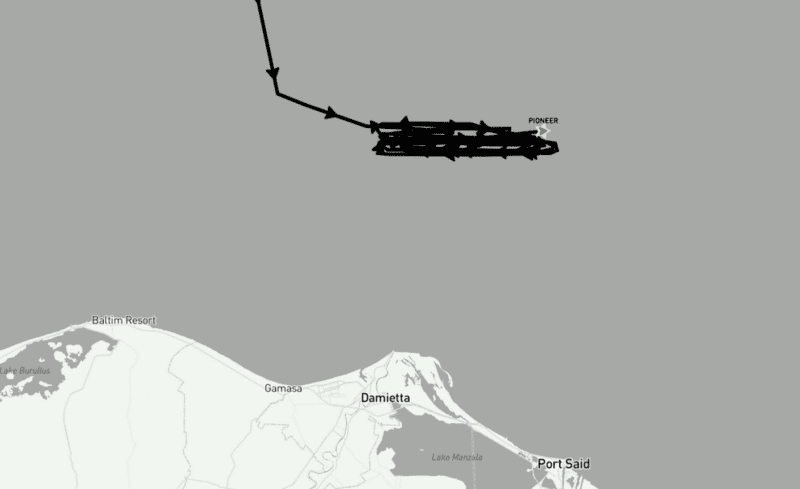U.S. Customs Revenue Tops $100 Billion for First Time Amid Tariff Surge
US revenue from customs duties this fiscal year surpassed $100 billion for the first time, reflecting higher tariffs imposed by the Trump administration.

By Malte Humpert (gCaptain) –
Russia’s shadow fleet operation continues to expand and now includes the first apparent ship-to-ship transfer of liquefied natural gas (LNG) in an effort to obscure the sanctioned cargo’s origin.
LNG carrier Pioneer, which picked up the initial cargo from Russia’s sanctioned Arctic LNG 2 project three weeks ago, met up with New Energy just north of the Suez Canal. The transfer was first spotted by industry service website, TankerTrackers.
The transfer of LNG at sea outside port facilities is more challenging than the routine ship-to-ship operation for crude oil Russian vessels have conducted for several years.
However, Russia has built up significant expertise in LNG transfers since 2017 and completed more than 150 STS operations by vessels in service of energy company Novatek.
Pioneer traveled past Norway and into southern Europe and had been circling for days north of Egypt’s Port Said before deactivating its AIS transponder on August 22. Its counterpart arrived from the south via the Suez Canal, one of only a handful of LNG carriers using the route in recent months, and similarly disengaged its transponder.

While Pioneer was included in U.S. State Department sanctions action on August 23, New Energy, remains unsanctioned, though it is almost certainly going to attract the attention of U.S. authorities.
Satellite images confirm the meeting of both vessels and show them alongside 20 nautical miles northeast of Port Said. Ship-to-ship transfers of LNG, depending on volume, routinely take 36-48 hours in calm seas.
Russia may currently be readying a second STS operation. Asya Energy, the second LNG carrier calling at Arctic LNG 2 a week or so after Pioneer, completed an abrupt 180 degree turn off Norway’s coast and returned to Russian Arctic waters. It currently sits to the north of Murmansk near Kildin Island, a location prominently used for several dozen STS transfers of cargo from the Yamal LNG project.
Russia’s shadow fleet operation has carried out various AIS falsification methods, including circular spoofing and slow roll spoofing, to fool Western authorities, to little avail.
The latest vessel attempting to abscond to Arctic LNG 2 is Everest Energy, which apparently inadvertently and temporarily broadcasted its correct location near sanctioned project over the weekend. A sign that Russia’s LNG shadow fleet operation remains in early stages.

With a smaller global LNG fleet and limited loading and unloading points, the creation of a successful dark fleet LNG operation will likely prove more challenging than for Russia’s oil sector counterpart.

Sign up for gCaptain’s newsletter and never miss an update

Subscribe to gCaptain Daily and stay informed with the latest global maritime and offshore news


Stay informed with the latest maritime and offshore news, delivered daily straight to your inbox
Essential news coupled with the finest maritime content sourced from across the globe.
Sign Up